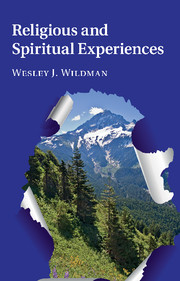Book contents
- Frontmatter
- Contents
- List of figures
- Preface
- Acknowledgements
- 1 Exploring a strange yet familiar landscape: a strategy for interpreting religious and spiritual experiences
- 2 Spirituality and the brain: a revolutionary scientific approach to religious and spiritual experiences
- 3 A smorgasbord of dangers and delights: the phenomenology of religious and spiritual experiences
- 4 Gateway to ultimacy: the importance of intense experiences
- 5 Can you trust your instincts? The cognitive reliability of religious and spiritual experiences
- 6 The brain-group nexus: the social power of religious and spiritual experiences
- 7 Make it start, make it stop! Religious and spiritual experiences in the future
- 8 Brains in bodies, persons in groups, and religion in nature: an integrative interpretation of religious and spiritual experiences
- Glossary of key terms
- References
- Index
5 - Can you trust your instincts? The cognitive reliability of religious and spiritual experiences
Published online by Cambridge University Press: 04 February 2011
- Frontmatter
- Contents
- List of figures
- Preface
- Acknowledgements
- 1 Exploring a strange yet familiar landscape: a strategy for interpreting religious and spiritual experiences
- 2 Spirituality and the brain: a revolutionary scientific approach to religious and spiritual experiences
- 3 A smorgasbord of dangers and delights: the phenomenology of religious and spiritual experiences
- 4 Gateway to ultimacy: the importance of intense experiences
- 5 Can you trust your instincts? The cognitive reliability of religious and spiritual experiences
- 6 The brain-group nexus: the social power of religious and spiritual experiences
- 7 Make it start, make it stop! Religious and spiritual experiences in the future
- 8 Brains in bodies, persons in groups, and religion in nature: an integrative interpretation of religious and spiritual experiences
- Glossary of key terms
- References
- Index
Summary
INTRODUCTION
Most people rely on their experiences to authorize their beliefs, including their religious and anti-religious beliefs. In fact, such reliance is so instinctive and pervasive that we are apt to take it for granted, and thereby likely to underestimate the degree to which existentially loaded and socially potent experiences inspire the fundamental beliefs and ways of thinking that orient our lives and guide our behavior. The question under discussion in this chapter is whether we can trust our RSE-based instincts. What reasons exist to accept or reject the beliefs to which the cognitive elements of RSEs give rise? In an era where many people are familiar with phenomena such as self-deception and brain washing, group-think and the manipulation of beliefs and behaviors by the mass media, the question of the cognitive reliability of RSEs is an especially pressing one. Unsurprisingly, many philosophers of religion in recent decades have attempted to evaluate the cognitive value of RSEs.
Previous chapters complicate the reliability question in precisely the right way. In particular, most of the short-circuited answers have already been rejected, leaving us with a less tractable but also more relevant puzzle. I begin here with a discussion of some possible answers to the question of the cognitive reliability of RSEs. I then take up what I think is the most promising line of analysis, namely, to regard some kinds of RSEs as types of perception.
- Type
- Chapter
- Information
- Religious and Spiritual Experiences , pp. 144 - 186Publisher: Cambridge University PressPrint publication year: 2011



